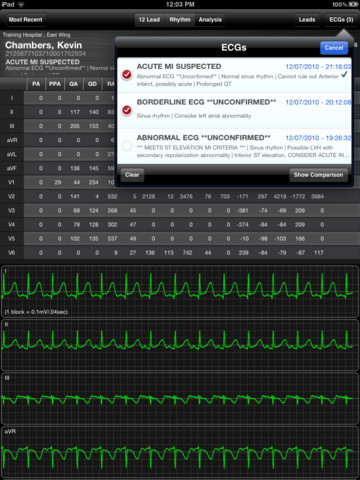
AirStrip Cardiology iPad
San Antonio, Texas-based Airstrip and Camden, NJ-based mVisum recently announced that they had settled the lawsuit AirStrip brought against mVisum in October 2012 for allegedly infringing on AirStrip’s patent for remote monitoring of patient medical data on smartphones. The settlement will see mVisum continuing to sell its products as long as those products aren't violating AirStrip's patent, which it first announced in August 2012.
Specifically, mVisum stated that it will not offer products that include the "streaming or displaying of real time or near real-time patient physiological data, and products that compress, cache, or buffer patient physiological data on a smartphone or tablet."
AirStrip stated that it has withdrawn its legal action and that neither company is licensing IP from the other. Originally, AirStrip had asked for an injunction barring future infringement, triple damages, and attorneys’ fees in its suit against mVisum, but no specific details around how much if any money changed hands as part of the settlement.
In a column for MobiHealthNews last October, patent lawyer Orion Armon, who is part of the IP Litigation practice group at Cooley, wrote that: "AirStrip’s and Robert Bosch Healthcare’s actions are notable because they seem to indicate that mHealth companies are becoming more assertive about their patent rights. Loudly advertising patent rights and filing patent infringement lawsuits tends to create insecurities in competitors that may spark patent arms races or precipitate business disputes that result in additional litigation."
Just a few days after the companies announced the settlement, mVisum issued another press release to announce that it had been award five new patents in recent months: "These [five] patents include various aspects of technologies for mVisum’s event driven communication and platform-independent data review capabilities adding to the previous [two] patents allowed in 2011 and 2012," the company wrote.
Despite the settlement, there are no apparent changes to mVisum's product page on its website.
"In addition to the rise in litigation, the settlement also says something about the strength of AirStrip’s patent," Armon told MobiHealthNews via email. "Any time an alleged infringer agrees to remove functionality from its products, it tends to suggest that the patent at issue deserves some respect. Of course, on the other hand, if the allegedly infringing features were unimportant or unused, the agreement may simply reflect that mVisum doesn’t care about them, or that it has a different/better approach that it intends to implement as a design-around."
Armon is just speculating but he suggests: "At this early stage in the litigation, I’d be more inclined to reach the second conclusion, but the next alleged infringer better watch out – AirStrip will point to this outcome as a basis for arguing that it should obtain a permanent injunction if it wins at trial. At the very least, a credible argument for injunctive relief tends to drive up the cost of a license."














